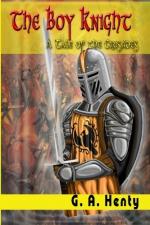“I think we had better not,” Cuthbert said.
“We might not succeed in getting in, as the passage may have fallen further along; but I will speak to him and tell him that we have something on hand which may alter his dispositions for fighting to-morrow.”
Cuthbert made his way to the earl, who had taken possession of a small cottage a short distance from the castle.
“What can I do for you?” Sir Walter said.
“I want to ask you, sir, not to attack the castle to-morrow until you see a white flag waved from the keep.”
“But how on earth is a white flag to be raised from the keep?”
“It may be,” Cuthbert said, “that I have some friends inside who will be able to make a diversion in our favor. However, sir, it can do no harm if you will wait till then, and may save many lives. At what hour do you mean to attack ?”
“The bridges and all other preparations to assist us across the moat will be ready to-night. We will advance then under cover of darkness, and as soon after dawn as may be attack in earnest.”
“Very well, sir,” Cuthbert said. “I trust that within five minutes after your bugle has sounded the white flag will make its appearance on the keep, but it cannot do so until after you have commenced an attack, or at least a pretense of an attack.”
Two or three hours before daylight Cuthbert accompanied Cnut and twenty-five picked men of the foresters to the copse. They were provided with crowbars, and all carried heavy axes. The door was soon pried open. It opened silently and without a creak.
“It may be,” Cnut said, “that the door has not been opened as you say for years, but it is certain,” and he placed his torch to the hinges, “that it has been well oiled within the last two or three days. No doubt the baron intended to make his escape this way, should the worst arrive. Now that we have the door open we had better wait quiet until the dawn commences. The earl will blow his bugle as a signal for the advance; it will be another ten minutes before they are fairly engaged, and that will be enough for us to break open any doors that there may be between this and the castle, and to force our way inside.”
It seemed a long time waiting before the dawn fairly broke—still longer before the earl’s bugle was heard to sound the attack. Then the band, headed by Cnut and two or three of the strongest of the party entered the passage.
Cuthbert had had some misgivings as to his mother’s injunctions to take no part in the fray, and it cannot be said that in accompanying the foresters he obeyed the letter of her instructions. At the same time as he felt sure that the effect of a surprise would be complete and crushing, and that the party would gain the top of the keep without any serious resistance, he considered the risk was so small as to justify him in accompanying the foresters.
The passage was some five feet high, and little more than two feet wide. It was dry and dusty, and save the marks on the ground of a human foot going and returning, doubtless that of the man who had oiled the lock the day before, the passage appeared to have been unused from the time that it left the hands of its builders.




